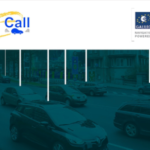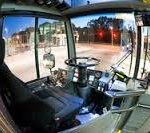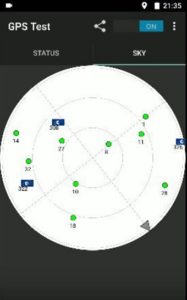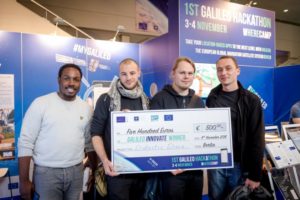The Disrupt Space 2017 brought the most promising space startups to meet with top investors and executives. This two-day event took place in Berlin and was fueled with business meetings, inspiring keynotes and hands on activities to foster collaboration towards building a sustainable space economy. Our colleague Vera Pinto Gomes* was on the Summit and presented the main highlights on the current and future status of EU space programmes that will benefit start-ups:
Category Archives: Galileo Applications
Galileo and EGNOS test campaign for eCall devices

The testing initiative follows the 17 January 2017 publishing of European Commission Delegated Regulation (EU) 2017/79. According to the regulation, all new M1 (passenger cars) and N1 (light duty vehicles) types must be equipped with eCall in-vehicle systems as of 31 March 2018. Read more…
Smart cities get a boost from Galileo

The idea behind GHOST (Galileo EnHancement as BoOster of the Smart CiTies) is simple yet incredibly effective. Instead of requiring heavy investment in new technologies, the consortium makes use of existing public transport solutions and connects them to a web portal by means of a camera equipped with a Galileo receiver. Once set up, the system takes pictures of predefined POIs, sends them to an image processing server that automatically detects anomalies, and reports these anomalies to relevant authorities by means of a web portal. Read more…
How to access raw GNSS measurements on smartphones

The technical briefing for app-developers at the first GSA Hackathon at Beuth Hochschule für Technik in Berlin covered the latest developments and opportunities for GNSS and Location Based Services (LBS) including both hardware and software. Read more…
Galileo boosts accuracy and makes positioning more precise

App-developers at the first GSA Hackathon in Berlin got a full technical briefing on the latest developments and opportunities for GNSS and Location Based Services (LBS) at Beuth Hochschule für Technik. The packed briefing session heard why the GSA wants the developer community to play with Galileo data, how it hopes to stimulate the community to use Galileo signals to enhance their applications and, therefore, bring the two closer together. Read more…
H2020 Applications in Satellite Navigation – Galileo – 2017 Call now open
To maximise the adoption of Galileo and EGNOS, the third Horizon 2020 call focuses on the development of user-oriented, downstream applications. Priority is also given to projects capable of stimulating the competitiveness of the European GNSS downstream industry.
Specifically, the call addresses four European GNSS topics, three within Innovation Action (IA) and the fourth in Coordination and Support Actions (CSA). Read more…
First Galileo Hackathon
The first ever European GNSS Agency (GSA) Galileo Hackathon brought together teams of passionate coders and geo enthusiasts from around the world to compete for some impressive prizes. The venue was Berlin’s Beuth University of Applied Sciences on 3 and 4 November during the sixth WhereCamp ‘unconference’ dedicated to geolocation enthusiasts and professionals. All the Hackathon competitors received a Galileo-ready BQ Smartphone and a certificate, while the two winning teams also each collected a €500 cash prize.
WhereCamp Berlin on 3 and 4 November was the place to be for movers and shakers shaping the future of Location Based Services (LBS) and Geo-IoT (Geolocation in Internet of Things). The first Galileo Hackathon was a unique opportunity to showcase coding skills, connect with the Geo-IoT app development community, and to gain a competitive insight on what Galileo LBS will be bringing to the smartphone in your pocket in the very near future. Read more…


